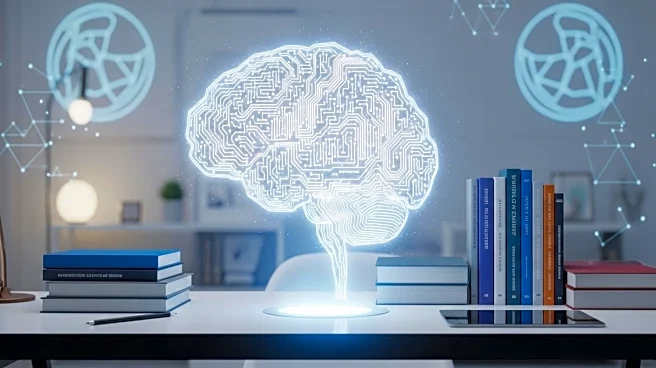What's Happening?
Education and child development experts are emphasizing the importance of parents engaging in conversations with their children about artificial intelligence (AI). As AI tools like ChatGPT become increasingly integrated into daily activities, including homework and mental health support, experts suggest that parents should guide their children in understanding both the benefits and potential risks associated with AI. Marc Watkins, a lecturer at the University of Mississippi, advocates for early discussions about ethical and responsible AI usage. He recommends interactive activities, such as playing AI-based games, to help children grasp the concept that AI operates based on data patterns rather than human-like understanding. The initiative aims to equip children with the knowledge to use AI responsibly and to recognize its limitations.
Why It's Important?
The growing use of AI among teenagers presents both opportunities and challenges. While AI can enhance learning and provide innovative educational tools, it also poses risks, particularly in mental health contexts. Research indicates that AI chatbots may fail to recognize serious psychiatric conditions, potentially offering unsafe advice. This underscores the need for parental involvement to ensure children use AI safely and effectively. By setting household rules and engaging in regular discussions, parents can help mitigate the risks associated with AI, fostering a balanced approach to technology use. This proactive engagement is crucial as AI continues to evolve and become more prevalent in educational and personal settings.
What's Next?
Parents are encouraged to co-create guidelines with their children regarding AI usage, focusing on safe applications such as supervised homework assistance and creative projects. Experts suggest monitoring the emotional impact of AI on children and prioritizing real-world interactions to balance digital engagement. As AI technology advances, ongoing parental involvement and education will be essential in adapting to new developments and ensuring that children benefit from AI while avoiding potential pitfalls. OpenAI, the company behind ChatGPT, is reportedly working on improving its models to better recognize signs of mental distress and direct users to appropriate care.
Beyond the Headlines
The integration of AI into children's lives raises ethical and developmental questions about technology's role in shaping future generations. As AI becomes more sophisticated, it challenges traditional educational methods and necessitates a reevaluation of how children learn and interact with technology. The potential for AI to influence mental health and social behaviors highlights the need for comprehensive studies and guidelines to safeguard young users. This development also prompts broader discussions about the ethical implications of AI in society and the responsibility of developers and educators in ensuring safe and beneficial AI applications.









